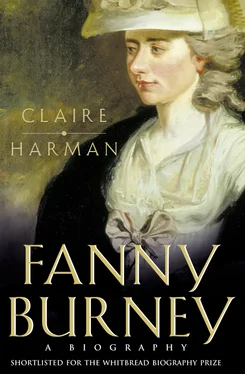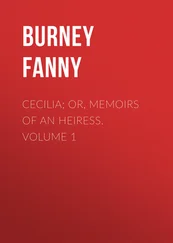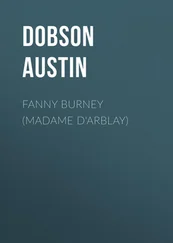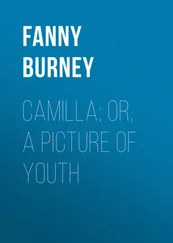In the 1740s, the MacBurneys were struggling to cross that line in the other direction. The family name was changed, soon after Charles’s birth, from MacBurney (or ‘Mackburny’ as the twins were christened) to plain Burney. This was probably done to facilitate James’s revived stage career, for as the scholar Roger Lonsdale points out, Charles Burney himself suggested the reason for another actor’s name-change from McLaughlin to Macklin might have been ‘to get rid not only of its Paddy appearance but of its harshness’. 8 The new name had an added significance for Charles: it marked a fresh start. Burney’s later success, riding under the banner of an (as he thought) untraceable family name, became a source of profound pride to himself and his children, so important to Fanny that her stated reason for destroying most of her father’s early memoirs was to protect ‘the Name of Burney’, even if it was only a few decades old and had started life as a professional convenience.
Charles Burney was assimilated back into his re-christened family when they moved to Chester in 1739. He had led what seems a truly happy, country-boy’s life at Condover with Nurse Ball, and left her with an ‘agony of grief’. 9 But the city offered obvious advantages, and at the Free School in Chester he began the musical training, as choirboy and then organist, which was to shape his life. The cathedral organist suffered from gout, and recruited the fourteen-year-old Burney as an assistant while the boy was still hardly able to read music. His success was such, both as a singer and player, that his half-brother James, who was organist of St Mary’s Church in Shrewsbury, asked to have him as an assistant. Charles ‘ran away’ back to his native town for a couple of years, despite his parents’ disapproval, but by 1744 was back in Chester, on the persuasion of his father ‘who I believe, loved me very affectionately’, as Charles wrote later. 10
However fragmented their family life was at times, James MacBurney’s strong paternal love and good nature held the clan together, and there were evenings of great gaiety in the household. Charles Burney inspired similar affection among his own children, recalling after one family party in later years,
we were as merry, & laughed as loud as the Burneys always do, when they get together and open their hearts; tell their old stories, & have no fear of being Quizzed by interlopers. It was so in my poor dear old father’s time, & my boyish days – when my brother Thomas from London – or James from Shrewsbury came on a visit to Chester, we used, young & old, Male & female, to sit up all night – not to drink, but to laugh à gorge deployée . 11
Charles Burney’s important career break came the same year (1744), when the composer Thomas Arne was passing through Chester on his way from Dublin to take up the post of composer at the Drury Lane Theatre. Arne got to hear of the diligent and talented young musician, who was already composing as well as able to play the violin, harpsichord and organ, and suggested to James Burney that the boy ought to be apprenticed to ‘an eminent Master in London’. On a subsequent meeting, Arne said that he himself would take Charles for £100 down, with no further liabilities, and at a third attempt said he would take him for nothing, realising he was still getting a good deal. Delighted and grateful, the Burneys of course agreed, though Charles was to look back on the bargain with mixed feelings.
Once in London, Arne got as much out of his apprentice as possible, making him transcribe quantities of music, teach junior pupils, run errands, play in the Drury Lane band and sometimes sing in the chorus there, any payment always going straight into the master’s pocket. Arne himself was passing the peak of his fame; the revival of his Masque of Alfred in 1745, containing the popular patriotic song ‘Rule, Britannia!’, was not successful, but his close connections with the capital’s best musicians and actors were very valuable to young Burney, who lived with the curmudgeonly composer and his wife in Great Queen Street and attended parties with them at the house of Arne’s sister, the actress Susannah Cibber. The charismatic David Garrick, who was to become a close friend of Burney, was the star of this coterie, which included Drury Lane and Covent Garden’s other leading men and ladies James Quin, Peg Woffington and Kitty Clive. Burney met literary men too, through his friendship with ‘the Scottish Orpheus’ James Oswald, James Thomson, Tobias Smollett and Christopher Smart among them. His career as an arch-networker among London’s bohemians was off to an excellent start.
As time went on, Burney became disillusioned with his apprenticeship to Arne. He was a hard worker, but his master’s regime did not reward his zeal. In fact, he came to think that Arne was deliberately holding him back. He felt he was wasted and wasting almost ‘into a consumption’ as an amanuensis, a chore which he hated (but which, years later, he was happy to impose on his own daughters). Arne was immoral, unfriendly and unprincipled, and after two years Burney’s loyalty to him had evaporated. When Fulke Greville, direct descendant of the Elizabethan poet, and ‘then generally looked up to as the finest gentleman in town’, 12 expressed a desire to take Burney into his employ – not as an apprentice, of course, but as a gentleman’s companion and music-maker – an escape route opened. It was not possible to leave Arne immediately, but Burney began to be patronised by Greville, invited to his grand country seat, Wilbury House in Wiltshire, and taken about when Greville was in town.
Greville’s style of life was lavish, ‘even princely’, as Fanny Burney learned from her father; he spent a great deal of time at the races or gambling clubs, at country houses or city mansions, with his outriders and entourage always on show, and two French-horn players hanging around waiting to perform ‘marches and warlike movements’ 13 during mealtimes. Charles Burney’s position in this splendid circus was a privileged one, based as much on his affability and intelligence as on his undoubted musical skills. * Burney was treated with respect and entrusted with Greville’s confidences, taking an active part in his master’s dramatic elopement with the beautiful heiress and poet Frances Macartney in 1748. It was a marriage to which no one actually objected, so the secrecy was unnecessary, but it was typical of Greville that he turned his nuptials into something of an amusement, and his twenty-two-year-old companion, enjoined to give the bride away, was only too happy to act as accomplice.
Though Burney was sampling high life through his increasing involvement with Greville – who finally bought the young musician out of his articles in 1748 for a down payment to Arne of three hundred pounds – he had developed his own social circle independent of either master. He had made the acquaintance of a gentleman called William Thompson, and spent three months of 1745 at Thompson’s home in Elsham, Lincolnshire, in ‘one continued series of mirth, amusement & festivity’. Miss Molly Carter, with whom he was still corresponding in the year of her death, 1812, was one of the ‘young ladies of the neighbourhood’ with whom Burney was probably in love. She was ‘very young, intelligent and handsome’, as he recorded in his memoirs; 15 adding meaningly, ‘[I] never passed my time more pleasantly in my life’. In London, he attached himself to the household of his brother Richard, who was earning a living as a dancing-master in Hatton Garden. Both young men had fond memories of their uninhibited village upbringing, and probably tried to reproduce something of its freedom and jollity in the regular private dances held in Richard’s house. Writing in 1806, Burney recalled ‘the familiar manner in which the sexes treated each other in the hops I had seen in my early youth, in a village, where those ballets were literally Country dances , not Contre-danse , as the French pretend’. 16 Perhaps the same ‘familiar manner’ animated the Hatton Garden parties too. Certainly it was at one of them that Charles Burney met Esther Sleepe, an attractive young woman of about twenty-three. He had ‘an ardent passion for her person […] from the first moment I saw her to the last’, 17 and Esther seems to have reciprocated his strong feelings. By the autumn of 1748 he had got her pregnant.
Читать дальше












